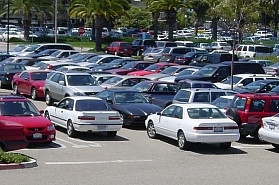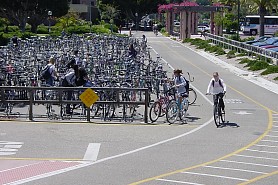
 |
 |
| The survey closed on Friday June 18. Thanks for stopping by. |
GPS signups remain open |
Thank you to the 2,300 who responded to the survey.
That's better than 8% of the campus community, and better than our dream target of 2,000.
June 21: Two lots of winners of the prize drawing have been selected, and will be notified shortly.
Data analysis in under way, and the project report should be complete by December 31.
Please return to this URL for the results, and periodic updates.
Thanks for dropping by! Click the buttons above to participate in the
travel survey on-line. Or download the hardcopy edition (English, Español) and drop it in campus mail.
Your response could win you a RCA Lyra MP3 player
or one of several gift certificates to the UCSB Bookstore and Jamba Juice.
We estimate that the probability of winning a prize in the drawing is approximately 1%.
We'll have to ask for your name and phone number — they will be used only for the drawing, not associated with the response.
You may leave them blank and not enter the drawing.
If you're taking the survey by hardcopy, please write your name and contact information on the form to register for the prizes.
Background
The purpose of our study is to analyze and
promote transit. Another urgent purpose is to address the parking
crisis at UCSB.
One reason for low transit use in American cities is the dispersion of
residential centers. It is uneconomical for transit operators to
service far flung neighborhoods, compared with compact, high-rise
apartments in say Hong Kong. However, large employment centers
such as universities do represent a rare concentration of demand on our landscapes, and
we argue that these should be the principal users of transit.
 |
| Valet/"stack" parking could become a permanent feature of the campus |
At UCSB, more than 80% of faculty and 75% of staff drive to work.
As the campus grows, parking demand is rising, and with new buildings being constructed,
supply of parking space has now fallen below demand. If nothing changes, the
situation will get much worse in the future. It costs about
$25,000 to provide each spot
in a multi-story garage, and if this is UCSB's only way out,
parking charges will have to increase considerably to recover these
costs. Valet assisted "stack parking," originally introduced as a
temporary measure, could become a permanent feature of the UCSB
campus. Clearly there is an urgent need to migrate UCSB's single
occupancy vehicle (SOV) drivers to carpooling, transit, biking and
walking.
Do bus services cover the city well enough that we can realistically
expect such a migration, or do new services need to be introduced,
better tuned to certain areas of the city and certain times of
day? What are the economics of that? How about licensing
the use of off-campus lots like churches and shopping malls, with a
shuttle service to campus? Could telecommuting reduce the numbers
coming to campus? How about parking permits that work only say on
Tuesdays and Thursdays? How much complexity and flexibility is
there in commuting schedules, and is it realistic to expect habits to
change?
Research Plan
This research project is funded by Caltrans through the California
Partners for Advanced Transit and Highways (PATH). There are 3 major components:
- a survey of UCSB students, staff and faculty to understand
personal schedules, transportation use habits, perceptions and
preferences;
- mapping
the addresses and routes of travelers to UCSB, and modeling the utility
of
transportation modes (i.e. using observations and models to predict
cost and likely
arrival time by bus, bike, car or foot, including waiting, bus
transfer,
searching for parking, walking to the office, etc); the identification
of areas where transit service level is high and not so high;
- the design of an express route catering to areas that are
currently not well served, and where bus use is most likely, based on
the models.
 |
14,000 bikes park on campus each day
|
The Survey
We invite all travelers to UCSB to take the travel survey. Most
respondents will answer about 25 questions, taking 10 minutes or
less. No personal information is
sought except your home address (which is obviously an integral part of
a commuting study), but you may mask it by rounding it to the
nearest 100. You could leave your address off entirely, though
that would reduce the usefulness of your response. But please do
not enter a fictitious address — that will really mess up the findings.
We will gather the IP address of your computer, so that we can audit
the data in the event of multiple submissions (inadvertent or
deliberate) of the form (an IP address looks like "128.111.255.255" for
example; while it is technically possible to link this to a person's
address, it would usually require information from your Internet
Service Provider to do so, and ISPs do not normally divulge this). Once
the data are checked, the IP address on each record will be discarded.
GPS Tracking
We would like to track a few travelers using
GPS, to
document travel time and route to campus. No personal information
is attached to the data, but obviously we'll need to communicate with
you and equip your car/bike, so we'll need some personal details. Click the "Sign up for GPS tracking"
button below.
Our role in UCSB policy
UCSB Transportation and Parking Services (TPS) support and facilitate
the study, and
will be apprised of its findings and recommendations; however the
investigators in the
study are not directly responsible for formulating or enforcing UCSB transportation
policy.
Some questions hypothesize dramatic hikes in parking rates, and
off-campus parking arrangements. Our intention in asking these scenario
questions is to gauge how respondents
weigh time versus cost, and we use this to develop utility estimates
and to design services that meet those needs. Bus
riders are similarly asked how they trade off fewer transfers versus
longer routes.
If you have concerns about the study, or suggestions to improve its effectiveness, please e-mail vital@ncgia.ucsb.edu
Thanks again. We appreciate your assistance with our study, and in decongesting UCSB.

 |
VEHICLE
INTELLIGENCE & TRANSPORTATION ANALYSIS LABORATORY
University of California, Santa Barbara
|
 |


